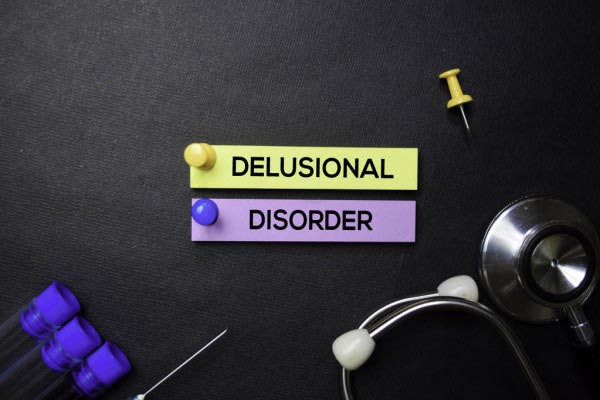What is Delusional Disorder (Paranoid disorder)
People with Delusional Disorder or distorted reality syndrome (also called paranoid disorder) hold onto unwavering, false beliefs that blur the lines between real and imagined. These false convictions can also appear in other conditions like paranoid thoughts, schizophrenia, bipolar disorder, and some personality disorders.
Overview of Delusional Disorder
People with delusional disorder have strong beliefs in things that aren’t real, but these beliefs might sound possible at first. They might involve false ideas about what’s happening around them or what they should do. However, these beliefs are actually untrue or very exaggerated. In contrast, bizarre delusions involve completely impossible things, like flying without a plane or visiting Mars.
Individuals experiencing delusional disorder, also known as paranoid disorder, often maintain social connections and manage daily life seemingly well. While their behavior doesn’t typically appear strange or disruptive, their lives can become significantly impacted if their false beliefs gain significant power. This uncommon disorder typically emerges in middle or late adulthood and affects women more frequently than men.

Symptoms of Delusional Disorders:
- Non-bizarre delusions which are the most evident symptoms
- Being short-tempered
- Aggression
- Poor mood
- Hallucinations such as feeling, hearing, or seeing things that are not real
Causes and Risk Factors:
The causes of Delusional Disorders are unknown but there is a role of genetics, environmental, or psychological factors that make them t more likely to occur.
Genetic factors
Like with some mental health disorders, there is a thought that a person is predisposed to having a Delusional Disorder which would have been passed on to the individual from their parents. When parts of the brain that regulate perception and thought patterns do not function properly, it can cause symptoms of this Disorder.
Environmental/psychological factors
Studies support that stress can give rise to the symptoms of Delusional Disorder. Intake of alcohol and illicit drugs may also add to it. People who are alone are more at risk to develop a Delusional Disorder.
Types of Delusional Disorder:
There are 6 Different types of Delusional Disorders. Details are mentioned below.
- Erotomaniac Delusions: The person believes that someone is in love with him, and he may try to connect with that person. Usually, Erotomaniac Delusional Disorder centers around a famous personality. It may lead to stalking behaviors.
- Grandiose Delusions: This is a magnified sense of self-obsession, supremacy, acquaintance, or personality delusion. The person in Grandiose Delusional Disorder believes that he is exceptional and that he has a significant influence.
- Jealous Delusions: The person thinks that his partner is disloyal and, the person may believe that a particular person has better attributes. This is the jealous type in the list of delusional disorders.
- Persecutory Delusions: The person in Persecutory Delusional Disorder leads its victim to believe that they are not being treated well by others or that someone is out to harm them in any way.
- Somatic Delusions: Somatic Delusional Disorders are focused on perceived physical impairments or medical issues.
- Mixed Delusions: Persons with Mixed Delusional Disorders have two or more of the types of delusions listed above.
Common Complications:
Individuals that suffer from Delusional Disorder (Paranoid disorder) may develop depression because of the consequences that occur related to their delusions. Reacting to the delusions also can evoke feelings of fear or they can lead to legal problems. For example, an individual with erotomanic delusions stalks or bothers the object of their delusion and their actions (e.g., stalking) can lead to an arrest. The individual can also be socially isolated and especially if their delusions interfere or harm their relations with others.
Diagnosis:
There currently is no lab or medical tests available to determine a diagnosis of Delusional Disorder. If medical tests are done, it is to rule out any physical cause for the symptoms of Delusional Disorder. These include:
- Obsessive-compulsive disorder
- Epilepsy
- Alzheimer’s disease
- Hallucination
- Delirium
- Schizophrenia or other mental health problems
If medical reasons for the symptoms are ruled out, the individual may be referred to a psychiatrist to collaborate on the diagnosis and for potential psychotropic medications.
To meet the diagnostic criteria for Delusional Disorder (Paranoid disorder) the person must have one or more delusions that last for one month or longer. The delusions have to affect the person’s life. The presence of mania or major depression should not accompany the delusions, and another mental health issue, medical condition. or medications are not suspected as the causative factors for symptoms.
Treatment of Delusional Disorder:
Psychotherapy and medications together can help manage Delusional Disorder (Paranoid disorder). The therapeutic approaches best used are:
- Individual psychotherapy helps the individual to identify and correct thinking patterns.
- Cognitive-behavioral therapy helps to recognize and transform the thoughts and behaviors that lead to delusions.
Family therapy helps families to deal with the loved one that has Delusional Disorder.

Medications: Usually an antipsychotic will be prescribed such as: :
-
- Conventional antipsychotics work by blocking dopamine receptors in the brain, which are involved in the development of delusions. Conventional antipsychotics include Fluphenazine (Prolixin) and Loxapine (Oxilapine) etc.
- Atypical antipsychotics work by blocking dopamine and serotonin receptors in the brain which are both somewhat involved in causing delusional disorder. These drugs include Clozapine (Clozaril) and Iloperidone (Fanapt) etc.
- Other medicines: Anti-depressants, sedatives, tranquilizers, and anti-anxiety drugs might help with depression, anxiety, or mood swings.
